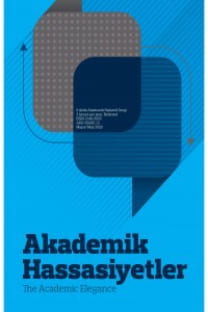DAĞITIMCI VE SOSYAL EŞİTSİZLİK EKSENİNDE EŞİTSİZLİĞİN FARKLI YÜZLERİ
DIFFERENT FACES OF INEQUALITY IN THE AXIS OF DISTRIBUTIVE AND SOCIAL INEQUALITY
eşitlik, eşitsizlik sosyal eşitlik,
___
- Albertsen, A. ve Midtgaard S. F. (2014). “Unjust Equalities”, Ethic Theory Moral Practice, 17:335–346.
- Arneson, R. (1989). “Equality and equal opportunity for welfare”. Philosophical Studies, 56: 77–93.
- Balaam, D. N. ve Dillman, B (2014), Introduction to International Political Economy. 6. Baskı, Pearson.
- Bartels, L. M. (2008). Unequal Democracy: The Political Economy of the New Gilded Age. Princeton: Princeton University Press.
- Cohen, G. A. (1989). “On the Currency of Egalitarian Justice”. Ethics, 99: 906–44.
- Dahl, R. (1996). “Equality versus Inequality”. Political Science and Politics, 639-649.
- Dworkin, R. (1981). “What is equality? Part 2: Equality of resources”. Philosophy and Public Affairs, 10: 283–345.
- Galtung, J. (1971). “A Structural Theory of Imperialism”. Journal of Peace Research, 8(2):81-109.
- Gilens, M. (2012). Affluence and Influence: Economic Inequality and Political Power in America. Princeton: Princeton University Press
- Fourie, C. (2012). “What is Social Equality? An Analysis of Status Equality as a Strongly Egalitarian Ideal”. Res Publica, 18,107–126.
- Frank, A. G. (1966). “The Development of Underdevelopment”. Monthly Review:17-31.
- Friedman, M. (1962). Capitalism and Freedom. Chicago, IL: University of Chicago Press.
- Hayek, F. (1944). The Road to Serfdom. Chicago, IL: University of Chicago Press.
- Holmes, M. ve McKenzie, J. (2019). “Relational happiness through recognition and redistribution: Emotion and inequality”. European Journal of Social Theory, 22(4), 439–457.
- Huntington, S.P. (1997). The Clash of Civilisations and the Remaking of World Order. New York: Simon and Schuster.
- Kirby, N. (2018). Two Concepts of Basic Equality. Res Publica, 24:297–318
- Lefranc, A., Pistolesi, N. and Trannoy, A. (2008). “Inequality of Opportunities vs Inequality of Outcomes: Are Western Societies All Alike?”, Review of Income and Wealth, 54(4), 513-546.
- Lenin, V. I. (1975) Imperialism: The Highest Stage of Capitalism: A Popular Outline, Moscow: Progress Publishers.
- Luk‟ianchikova and Iamshchikova, T. (2019). “The Theory and Reality of Social Inequality”. Russian Social Science Review, 60(5–6), 496–506.
- Mark, N. P. (2018). “Status Organizes Cooperation: An Evolutionary Theory of Status and Social Order”. American Journal of Sociology, 123(6), 1601–1634.
- Marx, K. (1957). Capital. Translated from the 4th German edition by Eden and Cedar Paul. London: Dent.
- --------- (2002). The Communist Manifesto. London; New York: Penguin Books, 2002.
- Mason, A. (2000). “Equality, personal responsibility, and gender socialisation”. Proceedings of the Aristotelian Society, 100: 227–246.
- Morgenthau, H. J. (1962). Politics Among Nations: The Struggle for Power and Peace. New York: Knopf.
- Pikety, T. (2014). Capital in the Twent-First Century. trans. Arthur Goldhammer. Cambridge, MA: Belknap Press.
- Putnam, R. D. (2015). Our Kids: The American Dream in Crisis. New York: Simon & Schuster.
- Rasmussen, D. C. (2016). “Adam Smith on What Is Wrong with Economic Inequality”. American Political Science Association, 110(2), 342-352.
- Ridgeway, C. L. (2014). “Why Status Matters for Inequality Authory”. American Sociological Review, 79(1), 1-16.
- Rousseau, J. J. (2009). “Toplum Sözleşmesi‟nden Seçme Parçalar” Batı‟da Siyasal Düşünceler Tarihi (Yeniçağ)‟nin içinde, der. Mete Tunçay, s: 377-421.
- Sachweh, P. (2017). “Criticizing Inequality? How Ideals of Equality Do and Do Not – Contribute to the DeLegitimation of Inequality in Contemporary Germany”. Historical Social Research, 42(3), 62-78.
- Schemmel, C. (2011). “Distributive and relational equality”. Politics, Philosophy & Economics, 11(2), 123–148.
- Smith, A. (1998). Wealth of Nations. Oxford: Oxford University Press.
- Spivak, G. (1988). “Can the Subaltern Speak?” derl. Cary Nelson ve Lawrence Grossberg içinde Marxism and the Interpretation of Culture London: Macmillan.
- Stanford Encyclopedia of Philosophy, Distributive Justice, https://plato.stanford.edu/entries/justice-distributive/ (Erişim tarihi: 20.11.2020)
- Stiglitz, J. (2012). The Price of Inequality: How Today’s Divided Society Endangers Our Future. New York: W. W. Norton.
- Wallerstein, I. (1974). “The Rise and Future Demise of the World Capitalist System: Concepts for Comperative Analysis”. Comperative Studies in Society and History, 14(4): 387-415.
- Waltz, K. (1979). Theory of International Politics. New York: McGraw-Hill.
- Weeden, K. A. ve Grusky, D. B. (2012). “The Three Worlds of Inequality”. American Journal of Sociology, 117(6), 1723–1785.
- Wilkinson, R. G. and Pickett, K. E. (2017). “The enemy between us: The psychological and social costs of inequality”. European Journal of Social Psychology, 47(), 11–24.
- Wolff, J. (2013). “Scanlon on Social and Material Inequality”. Journal of Moral Philosophy, 10: 406-42.
- Young, I. M. (1990). Justice and the Politics of Difference. Princeton, NJ: Princeton University Press.
- ISSN: 2148-5933
- Yayın Aralığı: 3
- Başlangıç: 2014
- Yayıncı: A Kitap
ÖRGÜTLERİN KESİKLİ TEKNOLOJİK DEĞİŞİMLERE UYUMU: TEKNOLOJİ VE ÖRGÜT İLİŞKİSİNE DÜŞÜNSEL BİR BAKIŞ
MİLLİYETÇİLİK ÇAĞINDA TÜRK KİMLİĞİ CEDİDİZM ÖRNEĞİ
HARVEY’İN MEKÂN TARTIŞMALARI EKSENİNDE YAŞLILARIN GÖZÜNDEN KENTSEL DÖNÜŞÜM
Cem ERGUN, Ayşe DERİCİOĞULLARI ERGUN
MERKANTALİZM VE SANAYİ DEVRİMİ SÜRECİNDE OSMANLI DEVLETİ’NİN KONUMU
AKADEMİDE MOBİNG VE CİNSİYETÇİLİK: ÇUKUROVA ÜNİVERSİTESİ ÖRNEĞİ
KENDİ OLMA SERÜVENİNİN ONTİK SANCISI: ÇİRKİN ÖRDEK YAVRUSU
RASYONEL SEÇİM TEORİSİ İLE ORGANİZE SUÇLARI ANLAMAK
Hakan REYHAN, Ayşen SATIR REYHAN
DAĞITIMCI VE SOSYAL EŞİTSİZLİK EKSENİNDE EŞİTSİZLİĞİN FARKLI YÜZLERİ
